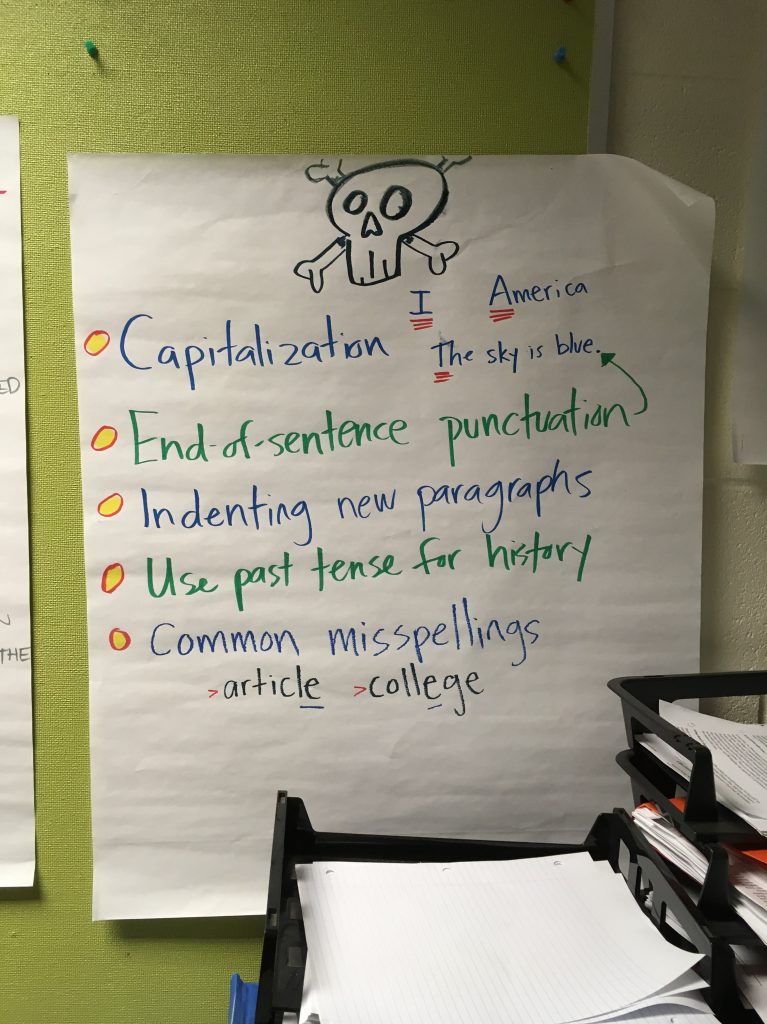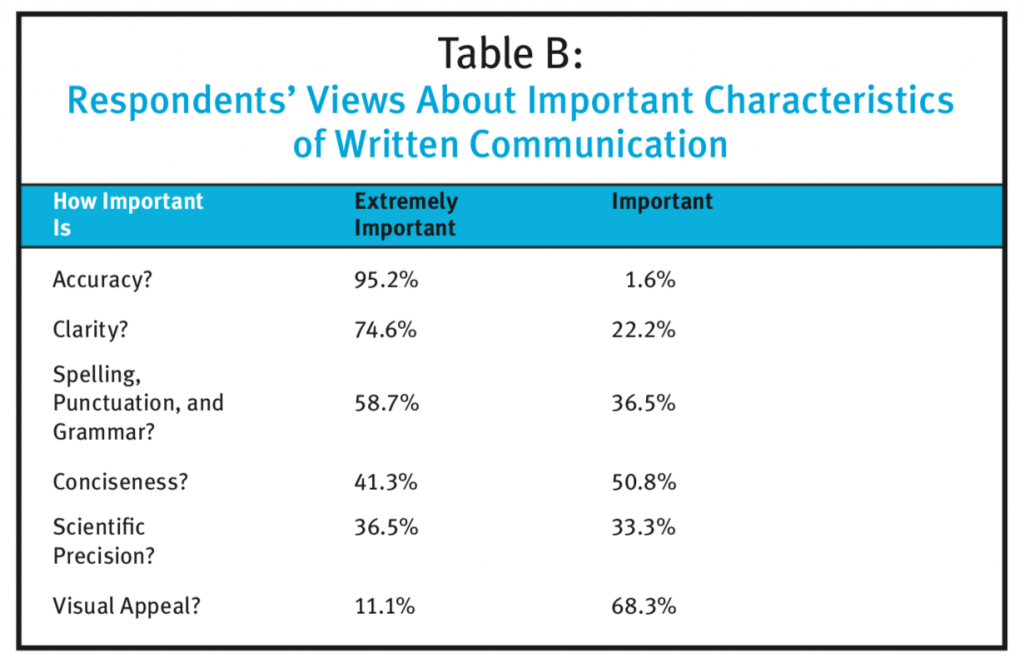A full year into using the skull and crossbones list, I can confirm that it does its job. When I speak with writing teachers, including those in the various content areas, they all share a visceral reaction to the kinds of writing errors that are habitual rather than intellectual. I'm talking about things like:
- not capitalizing the first letter of sentences
- not capitalizing proper nouns or the first person pronoun
- spelling frequently misspelled words incorrectly (e.g., America, article, college)
- not using end punctuation (e.g., periods) or paragraph indentation (when hand-writing)
- in historical writing, not using past tense
- in scientific writing, using phrases like “I think” or “I believe”
These are the kinds of skills that, at the secondary level, we can expect to refresh our students on a single time at the start of the year and then enjoy moving on to more complex, grade-appropriate skills.
And yet, the errors persist. Why? Because we let them!
Enter the Skullie:

Of course, it doesn't just magically work sitting there on the wall. The magic part comes from doing the following:
- After the first set of writing I saw from my students this school year, I said to them, “Hey everyone, I noticed some patterns in your writing that concern me. Open up a fresh page in your spiral notebooks, and draw a skull and crossbones at the top. This is where we're going to keep track of what I call the Skull and Crossbones List. Basically, these are things that, after today, I'm not going to accept in your writing. When I see these, no matter what assignment, I'll just stop reading, draw a simple skull and crossbones at the top, and then you'll need to go through the piece of writing and proofread. Don't worry — it's a short list.”
- I then quickly talk through the two errors that bother me the most in my ninth graders' writing:
- Not capitalizing: the first letter of a sentence, proper nouns, and I
- Not using end punctuation
- I then say, “So here's the thing: after getting to know you these past few days, I know how intelligent you are, and I can already see how much you are capable of. This means that I can't accept these kinds of errors. I wouldn't let my own children do this — not because I'm a jerk, but because I love them. There's no need to not always practice writing as conventionally as we can.”
- “Now, explain to your partner how the Skull and Crossbones list works and what to do if you find a skull and crossbones on your next piece of writing.”
With the instructional element out of the way, the truly magic ingredient comes to the fore: consistent follow-through. I've introduced the list, I've taught its items, and now I just need to do the work of helping my students internalize it.
When I see one of those errors, even on writing that my students submitted this week, (and as you can see from the list, I've added to it since that first little lesson) in student writing, I give it a Skullie.* At first, there were a lot of Skullies flying around, and then there were less, and now there are next to none.
But Dave, why be a jerk?
There's this weird idea that helping our students to not make unforced writing errors is somehow an unenlightened approach to teaching writing. To me, I'm just acknowledging what nearly 60% of surveyed employers across the industries value when making decisions about hiring and promotion:

But even beyond this utility value, there's a deeper lesson I'm trying to help my students learn all year long: details do matter, both for our prospective writing audiences and, even more importantly, for us. People outside of education don't walk around with 6+1 Writing Traits rubrics. Conventions, to most folks, aren't 1/6 of the lens through which to evaluate writing — conventions are the lens cap. If you lowercase the first person pronoun, you're done.
But even more importantly, I think there's something special about writing classes — and I'm using that term broadly to mean any science or social studies or technology or English class where kids are writing anything that's meant to be read by another human — where some kinds of sloppiness just aren't expected.
This isn't something I advocate for out of some lack of love for my students. It's the total opposite. I work to love my students as if they were my own children, and you can bet the Stuart kids are going to have some Skullies on their schoolwork as they become students of the craft of writing.
*There's even a teacher on Twitter who tweeted me once with a photo of a Skull and Crossbones stamp that she purchased. Her students call it Frank, and they use it as a verb — “Oh, dude, you got Franked.”
Jim Crawford says
Hi. I teach entry-level College Composition at my local community college. I’ve been following your blog for a couple of years now, and appreciate all of your tips and guidance. I adopted Gallagher’s “article of the week,” and it’s consistently been one of the most effective assignments in my courses.
On the other hand, I’ve found no effective way to encourage students to revise, proofread, and fix their own grammar and mechanical errors. I’ve tried various techniques over the years, some of which students claim are useful, but nothing yields obvious improvement. This semester, I thought I might try the skull and crossbones list, though I have a couple of questions on implementation.
First, do you give students a time limit to submit a Skull-free assignment (e.g. another week, or else the zero becomes permanent)?
Second, how might you discourage a student from deliberately inserting a few Skullies to buy more time on an assignment? I’ve got students who will work much harder to exploit loopholes than they will on the assignment itself.
Thanks for any advice, and thanks for running a useful, insightful, and encouraging blog. Congratulations on the new book!
davestuartjr says
Ah — that’s an amazing Skullie loophole, Jim. I hadn’t even thought of that!
I don’t put a time limit because so far it hasn’t been necessary. I do think urgency can be a useful external motivator, so maybe the 1 week limit would help.
At the college level with kids who are adept at exploiting systemic loopholes, perhaps a 10% penalty would be wise. I would play around with it, Jim — and all the while speak constantly to the life skills and dispositions that we are after with this Skull and Crossbones system.